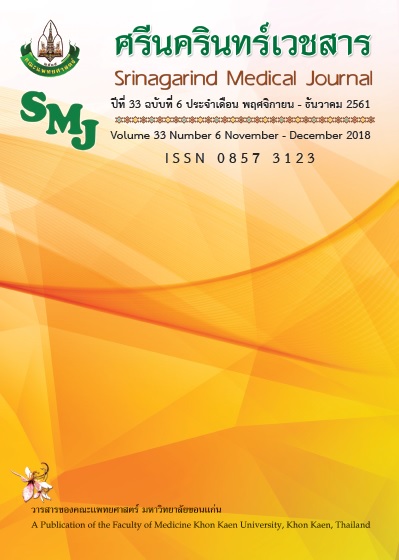The Stigma of Patients with Alcohol Use Disorder with Discrimination and the Human Rights in the Community Way of Life
Keywords:
Stigma of alcoholic patients, Discrimination, Human rights, Community way of life, ตราบาปของผู้ป่วยสุรา, การเลือกปฏิบัติ, สิทธิมนุษยชน, วิถีของชุมชนAbstract
ตราบาปของผู้ป่วยติดสุรากับการเลือกปฏิบัติ และสิทธิมนุษยชนในวิถีของชุมชน
นรากร สารีแหล้1*, กันตวิชญ์ จูเปรมปรี2, กัลยา มั่นล้วน3
1* พยาบาลวิชาชีพชำนาญการ โรงพยาบาลธัญญารักษ์อุดรธานี
2 วิทยาลัยพยาบาลบรมราชชนนี อุตรดิตถ์
3 คณะพยาบาลศาสตร์ มหาวิทยาลัยเวสเทิร์น วิทยาเขตบุรีรัมย์
หลักการและวัตถุประสงค์: การติดสุราส่งผลต่อสุขภาพของผู้ป่วย และเกิดปัญหาทางสังคมร่วมด้วย การศึกษานี้มีวัตถุประสงค์เพื่อศึกษาวิเคราะห์ตราบาปของผู้ป่วยสุราที่ถูกครอบงำภายใต้ปัจจัยวิถีของชุมชน และการเคลื่อนไหวในวิถีของชุมชนที่มีอิทธิพลต่อผู้ป่วยสุรา
วิธีการศึกษา: เป็นการศึกษาเชิงปฏิบัติการ ในผู้ป่วยสุรา 70 ราย เก็บข้อมูลโดยใช้ 1) แบบสอบถามข้อมูลทั่วไป 2) แนวทางการสนทนากลุ่ม และการสัมภาษณ์เจาะลึก 3) แนวทางการเสวนากลุ่มย่อย และ 4) แนวทางการจัดประชุมระดมสมองและสะท้อนคิด ใช้ระยะเวลาดำเนินการ 1 ปี (1 ตุลาคม 2559-30 กันยายน 2560) ทำการวิเคราะห์ข้อมูลด้วยการแจกแจงความถี่ ร้อยละ และวิธีวิเคราะห์เนื้อหา
ผลการศึกษา: ผู้ป่วยสุราที่ได้รับการช่วยเหลือและทำความเข้าใจในการปรับกระบวนทัศน์ในการตีตรา มีการก้าวผ่านและเห็นคุณค่าของตนเองมากขึ้น หลังการติดตามผลการรักษา ผู้ป่วยสุราเหล่านั้นกลับเข้ามารับการรักษาซ้ำลดลง และสามารถหยุดดื่มสุราเพิ่มขึ้น ทีมบำบัดมีกระบวนการเรียนรู้ภายในควบคู่ไปกับการดูแลผู้ป่วยซึ่งเป็นการก้าวข้ามช่องว่างระหว่างการบำบัดที่ทำให้เกิดการตีตราด้วยการดูแลด้วยหัวใจความเป็นมนุษย์ เข้าใจ เข้าถึงผู้ป่วยมากขึ้น มีทัศนคติที่ดีทั้งต่อตนเองและผู้ป่วย เกิดเครือข่ายในการดูแลสุขภาพของผู้ป่วย มีระบบการดูแลคนไข้ และระบบการส่งต่อจากเครือข่ายที่ดีขึ้น และการติดตามผลการรักษาที่ดี และมีประสิทธิภาพ
สรุป: ผู้ป่วยสุราที่เข้ารับการบำบัดรักษาลดการเกิดการตีตรา และการเลือกปฏิบัติ โดยได้รับการดูแลตามหลักสิทธิมนุษยชนมากขึ้น
Background and Objective: Alcohol use disorder could affect both health and social problems together. This study aimed to analyze the stigmatization of patients with alcohol use disorder, overwhelmed factors of the way of life of the community and the movement of community influences on alcoholic patients.
Method: This study was an action research design. The sample consisted of 70 alcoholic patients. The data were collected using 1) General information questionnaires, 2) Guideline for focus group discussion and in-depth interview, 3) Guideline for small group dialogue and 4) Guideline for brain storming and reflection. The study was conducted for one year period (October 1, 2016-September 30, 2017). The data were statistically analyzed by using frequency, percentage, and content analysis.
Result: The results showed that alcoholic patients is helping received and understanding stigmatized of justice of the paradigm. There are more steps and more self-esteem.. Therapeutic teams have an internal learning process, along with patient care, which transcends the gap between therapies that lead to stigmatization with Humanized Nursing Care, understand and show more empathy on patient , good attitude towards both self and patients in the network of health care of patients. The patients care system and network is better refer and good follow-up and effective.
Conclusion: Alcoholic patients received treatments have reduced the stigmatization and discrimination by being more cared for with human rights.
References
Laramée P, Leonard S, Buchanan-Hughes A, Warnakula S, Daeppen JB, Rehm J. Risk of all-cause mortality in alcohol-dependent individuals: a systematic literature review and meta-analysis. EBio Medicine 2015; 2: 1394-404.
World Health Organization, World Health Organization. Management of Substance Abuse Unit. Global status report on alcohol and health, 2014. World Health Organization; 2014.
Rose ME, Grant JE. Alcohol-induced blackout: phenomenology, biological basis, and gender differences. Journal of addiction medicine 2010; 4: 61-73.
จะเด็จ เชาวน์วิไล. ลด ละ เลิกเหล้า = สร้างสุขให้ครอบครัวและชุมชน : ถอดประสบการณ์การทำงานชุมชนลด ละ เลิกเหล้า : ลดความรุนแรงต่อผู้หญิงและเด็ก. พิมพ์ครั้งที่ 1. กรุงเทพฯ: มูลนิธิ
เพื่อนหญิง; 2553.
Goffman E. Stigma: Notes on the management of spoiled identity. Simon and Schuster; 2009 Nov 24.
Drake RE, Essock SM, Shaner A, Carey KB, Minkoff K, Kola L, Lynde D, Osher FC, Clark RE, Rickards L. Implementing dual diagnosis services for clients with severe mental illness. Psychiatr serv 2001 ;52: 469-76.
Dixon KA, Storen D, Van Horn CE. A workplace divided: How Americans view discrimination and race on the job. Rutgers, The State University of New York, John J. Heldrich Center for Workplace Development. 2002.
Browne G, Courtney M. Schizophrenia housing and supportive relationships. International Journal of Mental Health Nursing. 2007;16: 73-80.
Barry CL, McGinty EE, Pescosolido BA, Goldman HH. Stigma, discrimination, treatment effectiveness, and policy: public views about drug addiction and mental illness. Psychiatr Serv 2014; 65: 1269-72.
สกุล เฉียบแหลม. การปรับพฤติกรรม การดื่มสุราในชุมชน. วารสารวิทยาลัยพระปกเกล้า จันทบุรี Journal of Phrapokklao Nursing College 2018; 27: 160-8.
Link BG, Phelan JC, Bresnahan M, Stueve A, Pescosolido BA. Public conceptions of mental illness: labels, causes, dangerousness, and social distance.Am J Public Health. 1999; 89: 1328-33
Luoma JB, Kohlenberg BS, Hayes SC, Bunting K, Rye AK. Reducing self-stigma in substance abuse through acceptance and commitment therapy: Model, manual development, and pilot outcomes. Addict ResTheory 2008;16:149-65
พัชราวลัย กนกจรรยา,เพ็ญพักตร์ อุทิศ. ผลของโปรแกรมการบำบัดผสมผสานแบบสั้นโดยใช้การเสริมสร้างแรงจูงใจร่วมกับการปรับเปลี่ยนความคิดและพฤติกรรมต่อภาวะซึมเศร้าและพฤติกรรมการเสพสุราในผู้เสพติดสุรา. วารสารการพยาบาลจิตเวชและสุขภาพจิต 2013; 27: 56-68.
Livingston JD, Boyd JE. Correlates and consequences of internalized stigma for people living with mental illness: A systematic review and meta-analysis. SocSciMed 2010; 71: 2150-61.
รัตน์ศิริ ทาโต. การวิจัยทางพยาบาลศาสตร์: แนวคิดสู่การประยุกต์ใช้. กรุงเทพมหานคร: โรงพิมพ์แห่งจุฬาลงกรณ์มหาวิทยาลัย; 2552
โศภิณสิริ ยุทธวิสุทธิ, อรัญญา บุญธรรม, มงคลส่อง สว่างธรรม, กมลณิชา อนันต์, ธันยพร บัว เหลือง, ศรีสกุล เฉียบแหลม. การปรับพฤติกรรมการดื่มสุราในชุมชน. Journal of Phrapokklao Nursing College 2018; 27: 160-8
ลัดดาวัลย์ พิบูลย์ศรี, สุนทรี ศรีโกไสย. การพัฒนาศักยภาพพยาบาลในการดูแลผู้ป่วยติดสุรา. พยาบาลสาร 2558; 42: 132-40.
สุภาภรณ์ อุดมลักษณ์, ดลนภา ไชยสมบัติ, สมศรี ทาทาน. ความรู้และทัศนคติของนักศึกษาพยาบาลต่อ เครื่องดื่มแอลกอฮอล์และผู้ป่วยติดสุรา. วารสารการพยาบาลและการศึกษา 2017; 10:78-89
Keusch GT, Wilentz J, Kleinman A. Stigma and global health: developing a research agenda. The Lancet 2006; 367(9509): 525-7.
Keyes KM, Hatzenbuehler ML, McLaughlin KA, Link B, Olfson M, Grant BF, Hasin D. Stigma and treatment for alcohol disorders in the United States. American Journal of Epidemiology. 2010; 172: 1364-72.
Schomerus G, Lucht M, Holzinger A, Matschinger H, Carta MG, Angermeyer MC. The stigma of alcohol dependence compared with other mental disorders: a review of population studies. Alcohol and Alcoholism. 2010; 46(2): 105-12.
Crisp AH, Gelder MG, Rix S, Meltzer HI, Rowlands OJ. Stigmatisation of people with mental illnesses. BrJPsychiatry 2000; 177: 4-7.
Corrigan PW, Lurie BD, Goldman HH, Slopen N, Medasani K, Phelan S. How adolescents perceive the stigma of mental illness and alcohol abuse. Psychiatr Serv 2005; 56: 544-50.
Corrigan PW. Target-specific stigma change: a strategy for impacting mental illness stigma. PsychiatrRehabilJ 2004; 28: 113-21.


